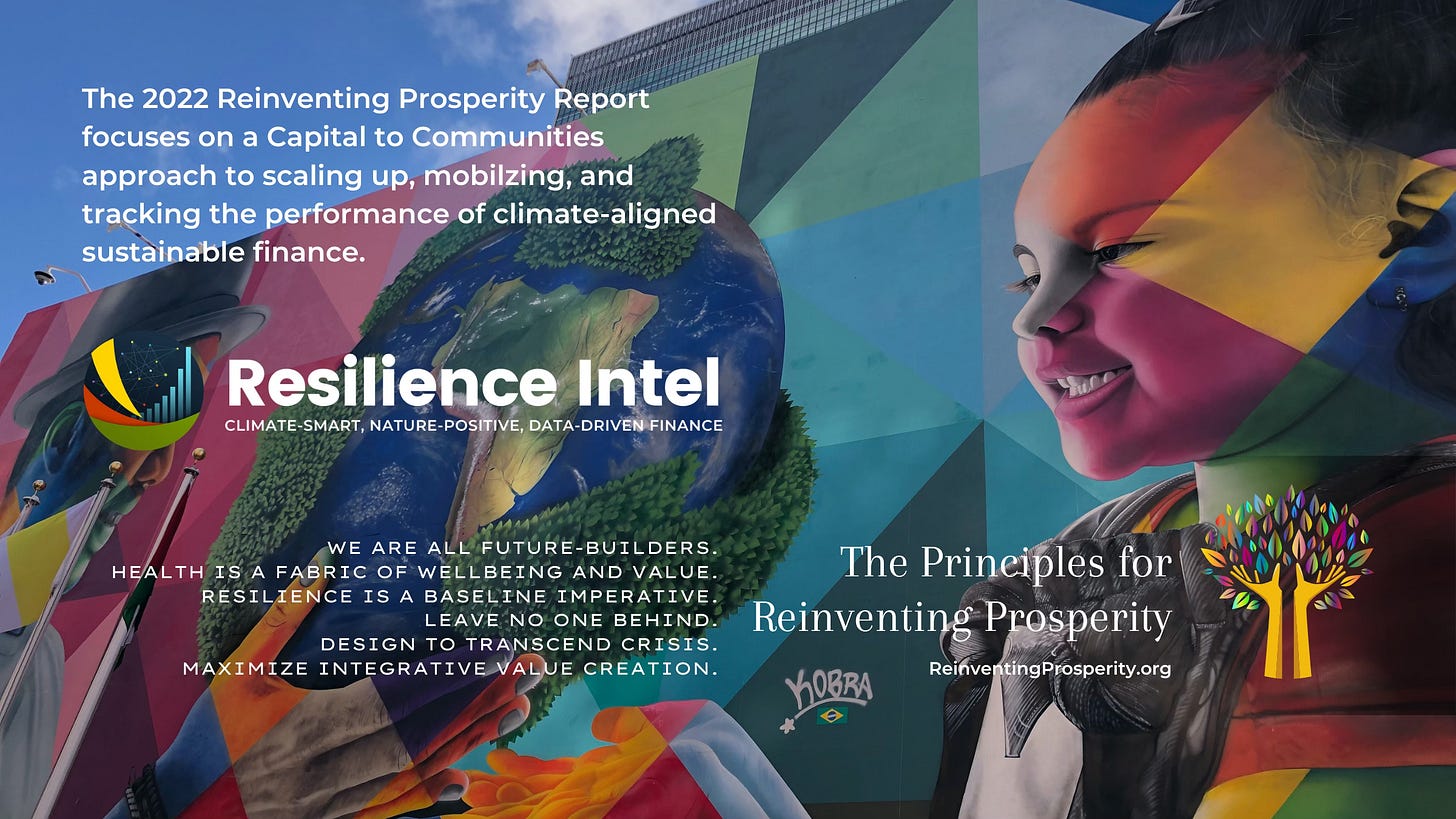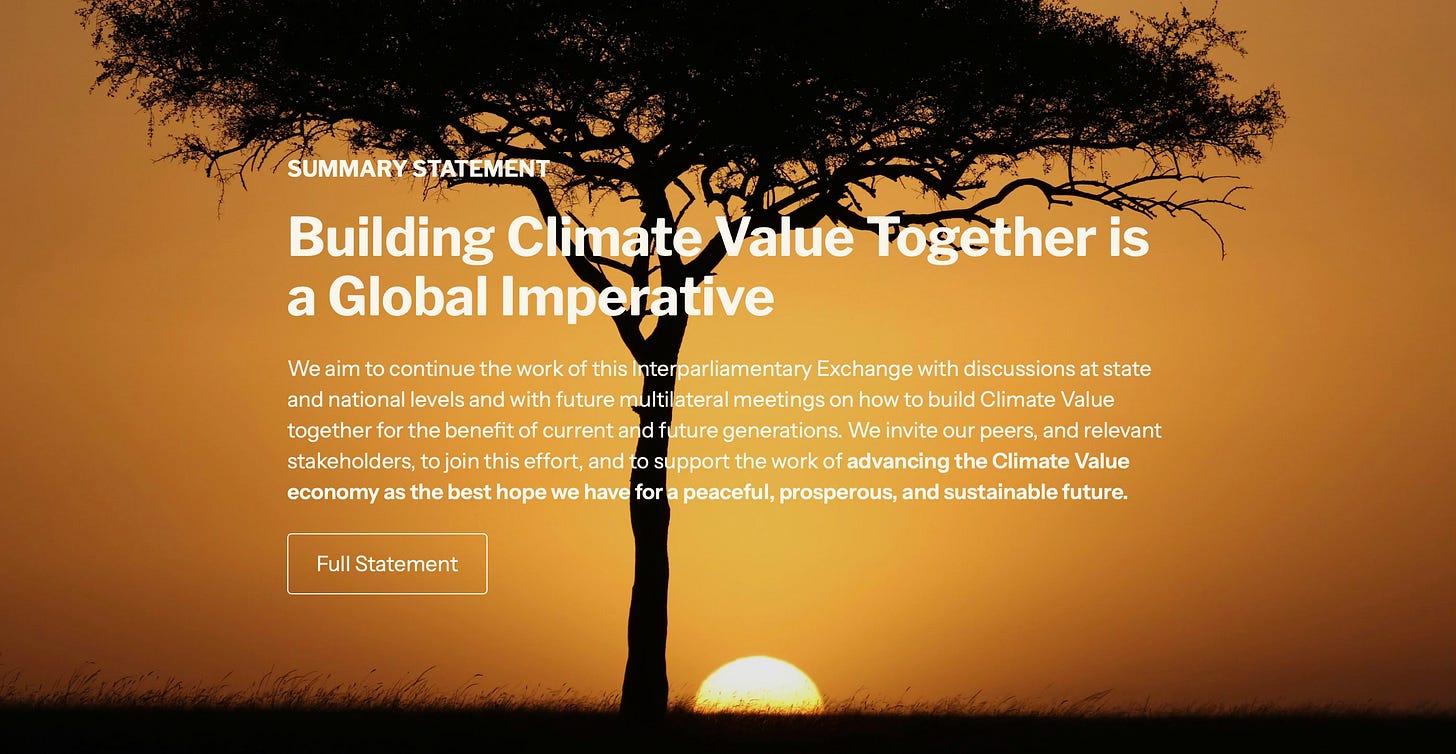Building Climate Value Together is a Global Imperative
Summary statement from the 2024 Interparliamentary Exchange on Climate Value, hosted by Citizens’ Climate International June 9-12, 2024, in Washington, DC
The first Interparliamentary Exchange on Climate Value took place during the Bonn climate negotiations, at a time when geopolitical and market forces are creating obstacles for successful global climate action. In this atmosphere of ongoing multidimensional global crisis and disruption, we wish to recognize that climate impacts are intensifying, becoming more frequent, and compounding risks for all.

We understand Climate Value as a reference to this broad and complex landscape of interacting and compounding risk, cost, and destabilization. Climate Value is a measure of the practical benefits of reducing risk, building resilience, and establishing sustainable everyday practices and the institutions to support them. Measuring Climate Value will be critical for achieving successful climate-resilient development—for affluent and vulnerable countries and communities.
A blog post detailing the events and insights shared during our Interparliamentary Exchange is available on the CCI website. Below, we outline major insights, and a call for coordinated action on key levers of change, to shape a livable climate future.
Climate impacts are intensifying.
To define and mobilize Climate Value as an investment imperative, we must first recognize that impacts are intensifying, becoming more frequent, and compounding cost and risk for all. During our Interparliamentary Exchange, we have discussed many ways in which ongoing climate disruption is already affecting lives throughout our countries and across the world:
Snowpack in the northern hemisphere, where 80% of humanity resides, is at historic lows; this suggests a need for significantly enhanced international cooperation to prevent major food and water shortages, price impacts, and related destabilizing effects.
Desertification and unsustainable practices are also depleting water resources, creating conditions for conflict that leads to permanent dislocation of long-standing populations. Cascading effects of these impacts add to the urgency of acting in an integrated and holistic way, as outlined in the Paris Agreement.
Loss of biodiversity and the degradation of ecosystems and watersheds poses a real and worsening structural threat to nature’s ability to support human food production.
Rural livelihoods are suffering as climate disruption interferes with reliable agricultural production. This can lead to alternative economic activities, some illegal, which further degrade natural systems. The deterioration of fresh water supplies, for example, creates compounding and escalating costs to human and environmental health.
Fire seasons in critical forest regions, which help to anchor major climate patterns and stabilize the climate, are expanding to be year-round. Projections suggest we will see more areas burned in 2024 and 2025 than ever before. We note that in 2023, Canada alone lost more forest to fire than the total combined area of half the world’s nations.
Dozens of countries already face unsustainable debt burdens linked to climate disaster response and related economic losses. Vulnerability-sensitive financial reforms are needed to ensure international peace and security and a sustainable future for all humankind.
Climate solutions are everyone’s business.
Through the U.N. General Assembly and the U.N. Climate Change negotiations, nearly 200 nations have formally recognized a universal human right to a clean, healthy environment1, and to sustainable development that is fair, inclusive, and empowers people to lead locally and build thriving societies.2 Recognizing that climate change is a common concern of all humankind, we acknowledge the catalytic effect of active stakeholder participation and ongoing open climate-related civic engagement.3
Political will lives in communities—in culture, in the everyday economy, and in the way people talk about aims and frustrations. Policy processes cannot be optimally effective, if they only play out in the language of experts, institutions, or interest groups. Climate-related civic engagement is a critical lever for driving effective climate policy and cooperation. This engagement should be treated as a measure of transparency and ambition.
Political office-holders can make faster decisions with better outcomes if they understand which areas of interest have the attention of philanthropies, multilateral finance institutions, public agencies, and trading partners, and—most crucially—how progress in those areas will affect life in communities.4
Poverty is an obstacle to transformation of everyday practices; rapid rollout of new technologies, new business models, and new kinds of institutions will require financial assistance.
Such aid is needed to close revenue gaps and to support improved livelihoods and macroeconomic conditions.
Climate-capable small and medium-sized enterprises can bring sustainable finance and innovation to local economies.
They can also provide critical data services that assist with verification and expand the reach of payments for climate services.
Education is a critical determinant of future capability.
Without climate change education—formal or informal—communities and countries will be less able to respond effectively to climate shocks and competition pressures related to fast-moving transformation.
This reduced capability will make them less attractive to investors aiming to expand Climate Value.
Acting to advance transparency, education, climate resilience, and effective cooperation, will open new opportunities for foreign investment and domestic resource mobilization.
This is the work of whole societies, so we urge decision-makers to recognize the importance of integrated and holistic climate policy and investment. That means effectively aligning financial flows, activating new multilateral cooperation agreements to accelerate climate-resilient development and adaptation sufficient to reduce or eliminate major threats, and public information and participation.5
Climate Value can drive enhanced multilateral cooperation.
Climate Value is a critical missing ingredient in local, national, and global analysis of finance, investment, public policy, and trade priorities. The world cannot wait for one perfect metric; we must accept that Climate Value will look and feel different, according to local context and experience. It will also connect to nearly all areas of sustainable and integrated human development.
Climate Value is not one metric, but a diverse family of multidimensional metrics. It must be connected to science and experience, to account for creation and destruction of background planetary health and underlying resilience value.
The Climate Value Exchange, and related networks and coalitions, should convene office-holders, institutions, and stakeholder representatives to identify the critical ingredients of a new economy founded on measurable and expanding Climate Value.
With multiple intersecting threats to planetary and human security, the ability of all nations to compete on a level playing field, while cooperating to advance sustainable development, is critical.
Just transition measures—supporting improved outcomes in marginalized communities in all nations, and allowing developing countries to leapfrog dirty development pathways—can build trust while expanding Climate Value for everyone.
Effective coalition-building, unbiased discussion among nation states, including input from local communities, municipal and provincial governments, and other stakeholders, can support enhanced international climate cooperation.
Such cooperative efforts should aim to accelerate climate-sensitive investments, in support of sustainable development benefits to people and nature, at the local, national, and global levels.
Civics & cooperation are accelerators of human security & wellbeing.
Multilateral climate cooperation as described in paragraph 8 of Article 6 of the Paris Agreement (Article 6.8) can and should be a critical driver of improved livelihoods and local economies. Such cooperation should support human development that is consistent with global heating of no more than 1.5ºC.
Regional multilateral cooperative arrangements can be the lever needed to make high integrity standards enforceable, investable, and mainstream. Climate-smart trade is an opportunity to a) reduce risk, b) build resilience, c) improve livelihoods, d) combat pollution, e) protect health, f) stabilize public finances, and g) get people what they need for everyday life while h) advancing climate action.
Aligning national and international climate-related investments and trade activity across the Paris Agreement is critical to achieving future economic wellbeing, political stability, and international peace and security.
Multidimensional multilateral climate cooperation, in line with Article 6.8 of the Paris Agreement, can be the key that unlocks new Climate Value-building opportunities across the whole economy. We should keep in mind the “integrated, holistic, and balanced” standard of Article 6.8. This broad-spectrum Cooperative Implementation standard invites us to align across ministries, sectors, communities, and regions, and across international institutions and conventions, to foster both clean development and successful adaptation and resilience measures.
Transparency and integrity are climate solutions.
All nations have made commitments to their people, and to the dignity of human beings around the world. Acting to prevent dangerous climate change is integral to fulfilling the basic responsibilities of public authorities and mainstream institutions.
Since 1992 when the world agreed to prevent dangerous human-caused climate change, and to reduce climate pollution as part of that effort, global heating emissions have continued to rise steadily. Science makes clear that we will not succeed in bringing about the best possible future for humankind, or for any of our nations, if we allow climate change to rampage across the world unchecked.
Our discussions included careful examination of how we can best structure public policy and international cooperation to avoid ineffective actions and unjust outcomes. We recognize that ineffectively structured offsetting programs can make room for and extend the life of polluting practices, while violating the rights of stakeholders and communities.
Carbon accounting, credits, and related financial arrangements, should be structured to accelerate reductions in overall global climate pollution. These programs should foster clean development, eliminate future emissions, and operate with verifiable high integrity.
A common insight shared in meetings before and during the Interparliamentary Exchange is that transparency brings legitimacy and builds trust. Part of this is the hard work of achieving accuracy in data for decision-making.6
Inclusion is a way of ensuring greater transparency and integrity. While it will vary according to context, participatory process can enhance the design of climate policies, accelerate implementation, make investments more viable and sustainable, and make it easier to mainstream climate solutions.
A call to action
We aim to continue the work of this Interparliamentary Exchange with discussions at state and national levels and with future multilateral meetings on how to build Climate Value together for the benefit of current and future generations. We invite our peers, and relevant stakeholders, to join this effort, and to support the work of advancing the Climate Value economy as the best hope we have for a peaceful, prosperous, and sustainable future.
This work can be followed on the Climate Value Exchange website.
Use the link behind the image below to share the formal outcome of the inaugural Interparliamentary Exchange on Climate Value.



